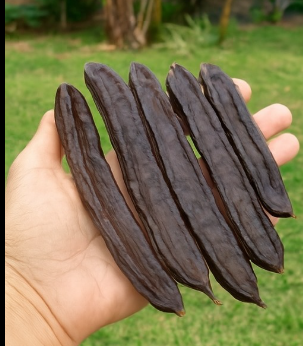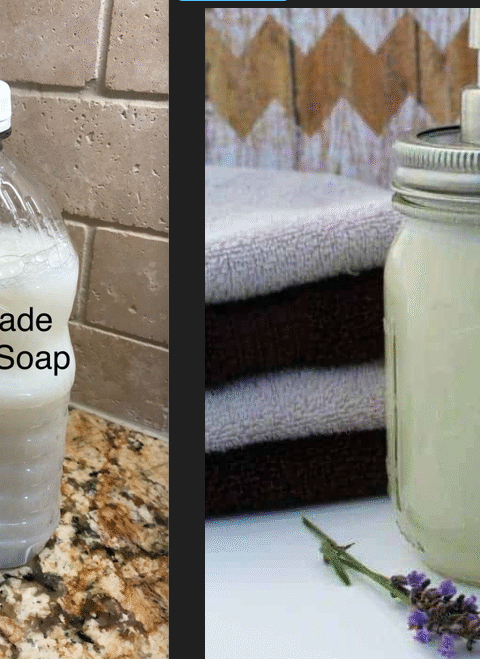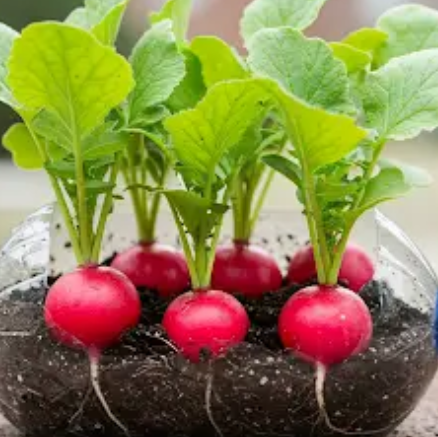Carob (Ceratonia siliqua): Health Benefits and Simple Homemade Uses
Carob, derived from the pods of the Ceratonia siliqua tree, is a naturally sweet, caffeine-free, and nutrient-rich alternative to cocoa. For centuries, it has been treasured in Mediterranean and Middle Eastern cultures for both its culinary and medicinal uses. Today, it stands out as a versatile ingredient offering numerous health benefits. In this article, we’ll dive deep into carob’s nutritional profile, health-promoting properties, and simple homemade uses you can try. 🍒
What is Carob?
Carob comes from the dried, ground pods of the carob tree, which is native to the Mediterranean region. Unlike cocoa, carob is naturally sweet, does not contain caffeine, and has a mild, earthy flavor. It can be used as a powder, syrup, chips, or even whole pods in cooking and baking.
Nutritional Profile of Carob
Carob is a powerhouse of nutrients, providing essential vitamins, minerals, and plant-based compounds.
| Nutrient | Per 100g | Health Benefit |
|---|---|---|
| Calories | 222 kcal | Provides energy while being lower in fat than cocoa. |
| Protein | 4.6 g | Supports muscle repair and growth. |
| Fiber | 39 g | Improves digestion and promotes satiety. |
| Calcium | 348 mg | Strengthens bones and teeth. |
| Iron | 2.9 mg | Supports healthy blood and prevents anemia. |
| Magnesium | 54 mg | Supports brain function and muscle health. |
| Potassium | 827 mg | Maintains healthy blood pressure. |
| Polyphenols | Rich | Reduces inflammation and oxidative stress. |
Top Health Benefits of Carob
1. Rich in Antioxidants
Carob contains polyphenols and flavonoids that protect cells from oxidative damage. Dr. Leila Nour, a nutrition scientist, notes that “antioxidants in carob may help reduce the risk of chronic diseases like heart disease and certain cancers.” 🌱
2. High in Fiber
Its impressive fiber content supports digestion, regulates bowel movements, and keeps you feeling full for longer.
3. Caffeine-Free
Unlike cocoa, carob is naturally caffeine-free, making it suitable for children, pregnant women, and those sensitive to stimulants.
4. Low in Fat
With almost no fat content, carob is a heart-friendly choice for those watching their cholesterol and weight.
5. Naturally Sweet
Carob’s natural sweetness reduces the need for added sugar, making it an excellent choice for desserts and drinks.
6. Bone-Strengthening Calcium
Carob is rich in calcium but free from oxalates, unlike cocoa, allowing for better calcium absorption.
7. Gluten-Free
Carob is safe for those with celiac disease or gluten intolerance.
8. Supports Heart Health
Its fiber, potassium, and zero cholesterol profile help manage blood pressure and improve heart function.
9. Improves Digestion
Carob tannins have antibacterial and anti-inflammatory effects on the gut.
10. Helps Soothe Diarrhea
Due to its mild astringent properties, carob is a traditional remedy for diarrhea.
11. Supports Weight Management
High fiber plus low calories = a snack that satisfies without overloading calories.
12. Boosts Immune Function
Vitamin E and other micronutrients in carob strengthen the immune system.
13. Good for Teeth
Carob is free from cocoa’s tooth-eroding acids and caffeine, making it safer for oral health.
14. Reduces Inflammation
Polyphenols in carob fight inflammation, aiding joint and skin health.
15. Supports Brain Function
Magnesium in carob contributes to nerve health and better cognitive performance.
16. Safe for All Ages
Suitable for toddlers, adults, and even pets (in moderation), as it’s non-toxic to dogs.
17. Helps Prevent Anemia
Iron in carob aids in healthy red blood cell production.
Simple Homemade Uses of Carob
1. Carob Powder for Baking
Replace cocoa powder in recipes with carob powder at a 1:1 ratio. Adjust liquid content slightly if batter seems dry.
2. Carob Syrup
Boil 5-6 carob pods in 4 cups of water for 30 minutes. Strain and simmer the liquid until thickened for a sweet syrup.
3. Carob Tea
Boil 1-2 dried carob pods or 2 tablespoons of carob powder in 3 cups of water for 10 minutes. Strain and serve.
4. Carob Milk
Mix 1 tablespoon of carob powder into warm milk or plant-based milk with a touch of sweetener.
5. Carob Energy Balls
Blend oats, dates, nuts, and carob powder, then shape into balls and coat with coconut flakes.
6. Carob Spread
Combine carob powder with coconut oil, honey, and milk powder for a delicious bread spread.
7. Carob Ice Cream
Blend frozen bananas, milk, and carob powder for a guilt-free frozen treat.
8. Carob Chips
Mix carob powder with melted coconut oil and honey, freeze, then break into chips.
FAQs About Carob
- Is carob healthier than cocoa? Yes, for some people. It’s caffeine-free, lower in fat, and naturally sweet.
- Can diabetics eat carob? Yes, in moderation, as it has a low glycemic index.
- Does carob taste like chocolate? Not exactly—it has a milder, earthier flavor.
- Is carob safe for pets? Yes, unlike chocolate, carob is non-toxic to dogs.
- Can I use carob in coffee? Yes, you can add carob powder for a mocha-like taste.
- Does carob contain sugar? It has natural sugars but is lower than many sweetened cocoa products.
- Is carob good for digestion? Yes, its fiber and tannins support gut health.
- Can carob help with diarrhea? Yes, its astringent properties can be soothing.
- Is carob suitable for children? Yes, it’s caffeine-free and nutrient-rich.
- Where can I buy carob? Health food stores, Mediterranean markets, and online retailers sell it in various forms.






